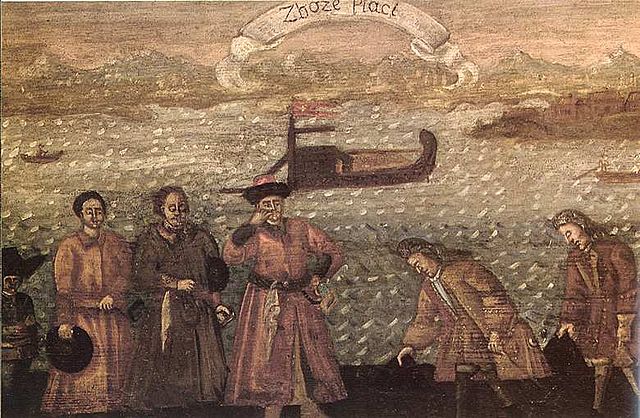 |
This is a file from the Wikimedia Commons. Information from its description page there is shown below.
Commons is a freely licensed media file repository. You can help.
|
Summary
| Artist |
Unknown from Poland |
| Title |
English: Grain pays - reverse of a double-sided painting.
Polski: Zboże płaci - rewers dwustronnego obrazu.
|
| Date |
1700s |
| Medium |
oil on panel |
| Dimensions |
32.5 × 56 cm (12.8 × 22 in) |
| Current location |
District Museum |
| Toruń |
| Notes |
English: Grain pays and Grain doesn't pay illustrate the notion that agriculture, once extremely profitable to the nobles ( szlachta) in the Polish-Lithuanian Commonwealth, became much less profitable from the second half of 17th century onwards.
|
| Source/Photographer |
ed. Marek Rostworowski (1983). Polaków portret własny: praca zbiorowa, Arkady. ISBN 83-21331-55-6 |
Permission
( Reusing this file) |
PD-Art |
Licensing
This is a faithful photographic reproduction of an original two-dimensional work of art. The work of art itself is in the public domain for the following reason:
| Public domainPublic domainfalsefalse |
 |
This work is in the public domain in the United States, and those countries with a copyright term of life of the author plus 100 years or less. |
|
This file has been identified as being free of known restrictions under copyright law, including all related and neighboring rights.
|
The official position taken by the Wikimedia Foundation is that "faithful reproductions of two-dimensional public domain works of art are public domain, and that claims to the contrary represent an assault on the very concept of a public domain". For details, see Commons:When to use the PD-Art tag.
This photographic reproduction is therefore also considered to be in the public domain. Please be aware that depending on local laws, re-use of this content may be prohibited or restricted in your jurisdiction. See Commons:Reuse of PD-Art photographs.
|
File usage
The following pages on Schools Wikipedia link to this image (list may be incomplete):
Schools Wikipedia was launched to make learning available to everyone. Thanks to SOS Childrens Villages, 62,000 children are enjoying a happy childhood, with a healthy, prosperous future ahead of them. Find out more about sponsoring a child.



